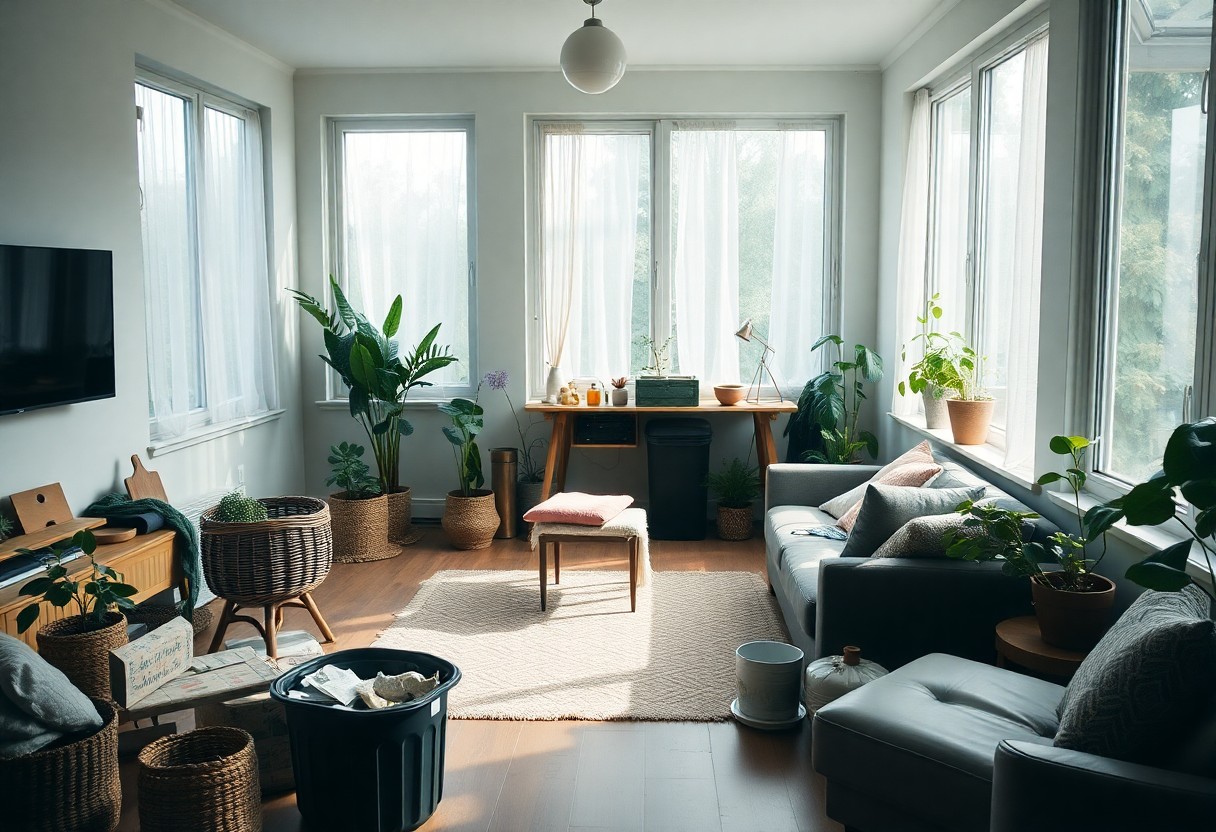Over time, small adjustments in your living space can significantly contribute to a zero waste lifestyle. By adopting simple yet effective practices, you can reduce waste and enhance sustainability in your home environment. This blog post will guide you through straightforward changes that not only minimize your impact on the planet but also promote a more mindful way of living. For more insights on embracing zero waste, check out this resource on Transitioning to a Zero-Waste Lifestyle After Your Move.
Understanding Zero Waste
The concept of zero waste revolves around the goal of reducing the amount of trash you send to landfills and incinerators. It encourages you to rethink your consumption habits and make choices that prioritize sustainability. By adopting a zero waste lifestyle, you can help protect the environment while promoting a more mindful approach to the way you live and interact with your surroundings.
Principles of Zero Waste
Zero waste is built upon five fundamental principles: refuse, reduce, reuse, recycle, and rot. These principles guide you towards minimizing waste by encouraging you to refuse unnecessary items, reduce what you consume, reuse wherever possible, recycle responsibly, and compost organic materials. By integrating these principles into your daily life, you can significantly lessen your environmental footprint.
Benefits to the Environment
Around the globe, the impact of waste is becoming increasingly evident. By adopting a zero waste lifestyle, you actively contribute to reducing pollution, conserving natural resources, and decreasing greenhouse gas emissions. This means cleaner air and water, as well as healthier ecosystems for both you and future generations.
With a focus on minimizing waste, you are taking significant steps toward environmental sustainability. Decreasing the amount of waste that ends up in landfills means less methane emissions, while prioritizing recycling and composting helps keep materials in circulation longer. By making these conscious choices, you support the health of the planet and pave the way for a more sustainable future. Your efforts can lead to a positive ripple effect, inspiring others to join in on the journey towards a zero waste lifestyle.
Assessing Your Current Waste Habits
Some initial reflection is necessary to pursue a zero waste lifestyle. Start by understanding your daily routines and how they contribute to waste production. Have discussions with your household about lifestyle changes, and if you’re seeking insights, check out this resource on how to convince your household to go Zero Waste. This awareness will lay the groundwork for making meaningful adjustments in your home.
Identifying Common Waste Sources
Sources of waste can vary from household to household. You might find that your kitchen, bathroom, and even your home office are frequent contributors to waste generation. Pay close attention to items you often throw away, such as food packaging, single-use plastics, or disposable toiletries. Recognizing these common sources is vital for your journey to reducing waste.
Tracking Waste Generation
Your awareness of waste generation plays a significant role in minimizing it. Alongside identifying common sources, keeping a record of the waste produced in your home will provide insights into your habits. This tracking can motivate you to find alternatives for the items you frequently dispose of, paving the way for sustainable choices.
At the start, consider keeping a simple log or chart that tracks the types and quantities of waste you produce over a week or a month. You may be surprised by how quickly waste accumulates and where it originates. This ongoing assessment allows you to pinpoint specific areas for improvement, making it easier to implement small, actionable changes toward a zero waste lifestyle.

Simple Changes for the Kitchen
Now is the perfect time to transform your kitchen into a zero waste haven. Small adjustments can have a big impact, like organizing your pantry to avoid shelling out for items you already own or swapping out plastic containers for glass ones. These simple changes set the stage for sustainable habits that contribute to your overall zero waste lifestyle.
Reducing Food Waste
Among the most effective ways to achieve a zero waste kitchen is by minimizing food waste. Planning meals ahead of time, utilizing leftovers creatively, and using your freezer can significantly reduce what goes uneaten. Being mindful of portion sizes and practicing proper food storage will help you fully enjoy your groceries while keeping waste to a minimum.
Alternatives to Single-Use Products
On your journey to a zero waste kitchen, consider alternatives to single-use products that litter your home. Ditch disposable paper towels for washable cloths, replace plastic cutlery with reusable options, and consider a sustainable shopping bag instead of plastic ones. These changes reduce your reliance on single-use items, making a positive impact on the environment.
Understanding the importance of alternatives to single-use products is key to reducing waste in your kitchen. Investing in high-quality, durable items such as beeswax wraps, glass storage containers, and stainless steel straws allows you to enjoy convenience without the cost to the environment. Each choice you make reinforces a sustainable lifestyle that values longevity and minimal waste, allowing you to take pride in your environmentally friendly kitchen.

Transforming the Bathroom
All it takes are a few mindful adjustments in your bathroom to make a remarkable difference in your journey towards a zero waste lifestyle. By swapping out disposable items for sustainable alternatives, you contribute to a healthier planet. For more tips on incorporating sustainable practices into your life, check out How to Reduce Waste: 21 Ideas for Zero Waste Living.
Sustainable Personal Care Products
Against the backdrop of traditional personal care items, you have the opportunity to choose products that not only benefit your skin but also reduce environmental impact. Opt for shampoo bars, bamboo toothbrushes, and refillable containers that can dramatically lessen waste in your bathroom routine.
Eco-Friendly Hygiene Practices
Transforming your hygiene practices can lead to significant reductions in waste. Consider using cloth alternatives for your bathroom needs, such as reusable wipes or menstrual products. These not only reduce single-use items but also save you money over time.
Sustainable practices in your hygiene routine help to minimize landfill waste and promote a healthier ecosystem. By selecting reusable products and natural materials, you are consciously making choices that respect both your body and the environment. It’s a step toward creating a more sustainable bathroom experience that aligns with your zero waste goals.
Rethinking Home Décor
After evaluating your home décor choices, you may realize that even small changes can lead to a more sustainable lifestyle. By reconsidering your design approach, you can prioritize eco-friendly options that reduce waste and promote a cleaner environment. Simple upgrades to your space, such as selecting items with longevity and sustainability in mind, can transform not only your home but also your overall impact on the planet.
Upcycling and Repurposing
Home décor doesn’t always have to be brand new. Explore creative ways to upcycle or repurpose items you already own. This process not only saves materials from the landfill but also adds a personal touch to your space. By transforming old furniture or décor, you can create unique pieces that reflect your style and commitment to sustainability.
Choosing Sustainable Materials
Against using conventional materials, you should consider opting for sustainable ones. Materials like bamboo, reclaimed wood, or recycled metals are not only environmentally friendly but also add character and warmth to your home. By thoughtfully selecting the materials you use, you make a significant difference in reducing waste and promoting a healthy planet.
And when you choose sustainable materials, you support companies that prioritize environmental responsibility. These materials often require less energy to produce and can be sourced locally, further reducing their carbon footprint. Investing in quality items made from sustainable resources ensures your home décor stands the test of time, beautifully blending aesthetics with ethical considerations.
Creating a Zero Waste Mindset
Despite the challenges of shifting to a zero waste lifestyle, cultivating the right mindset is an imperative first step. Embracing a zero waste philosophy begins with recognizing the impact of your choices and understanding that small, conscious changes can make a significant difference. This mindset encourages you to rethink consumption, prioritize sustainability, and adopt habits that reduce waste. Over time, these small shifts can lead to a more sustainable way of living, benefitting both you and the planet.
Educating Yourself and Your Family
Across various platforms, there is a wealth of information available on sustainable practices and zero waste living. By taking the initiative to educate yourself and your family, you can foster awareness and understanding of the waste problem in your community. Reading books, watching documentaries, and following relevant blogs can cultivate an informed mindset, making sustainable choices a collective family effort.
Involving Your Community
Waste reduction is not just a personal journey; it can also be a communal effort that strengthens ties and fosters collaboration. You can actively engage with your neighbors, local organizations, and community groups to advocate for waste reduction initiatives. By sharing knowledge, resources, and experiences, you empower each other to adopt sustainable practices and amplify your collective impact.
Another effective strategy for involving your community is to organize events focused on waste reduction, such as workshops, clean-up drives, or zero waste challenges. These activities not only raise awareness but also create a sense of belonging and shared purpose among participants. By connecting with others who share your values, you can build a support system that inspires change, making it easier for everyone to adopt a zero waste lifestyle together.
To wrap up
Hence, by implementing simple changes in your home, you can significantly contribute to a zero waste lifestyle. Starting with small, manageable steps like reducing single-use plastics, composting, and choosing sustainable products can create a ripple effect in your life and community. You empower yourself while inspiring others to make mindful choices. Every effort you make counts, leading to a more sustainable future and fostering a deeper connection with the environment. Embrace these changes and see how they transform your lifestyle and impact the planet positively.



